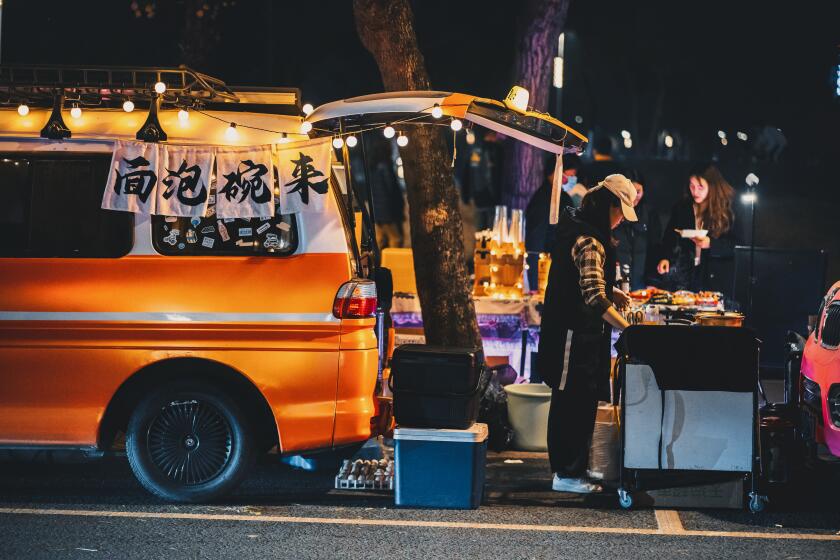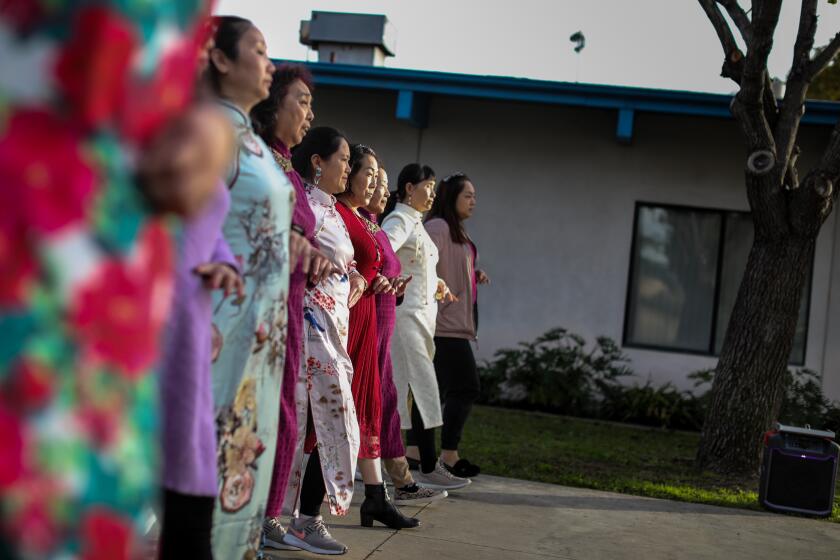In an L.A. suburb, Chinese ‘border crossers’ seek a new life after harrowing journey
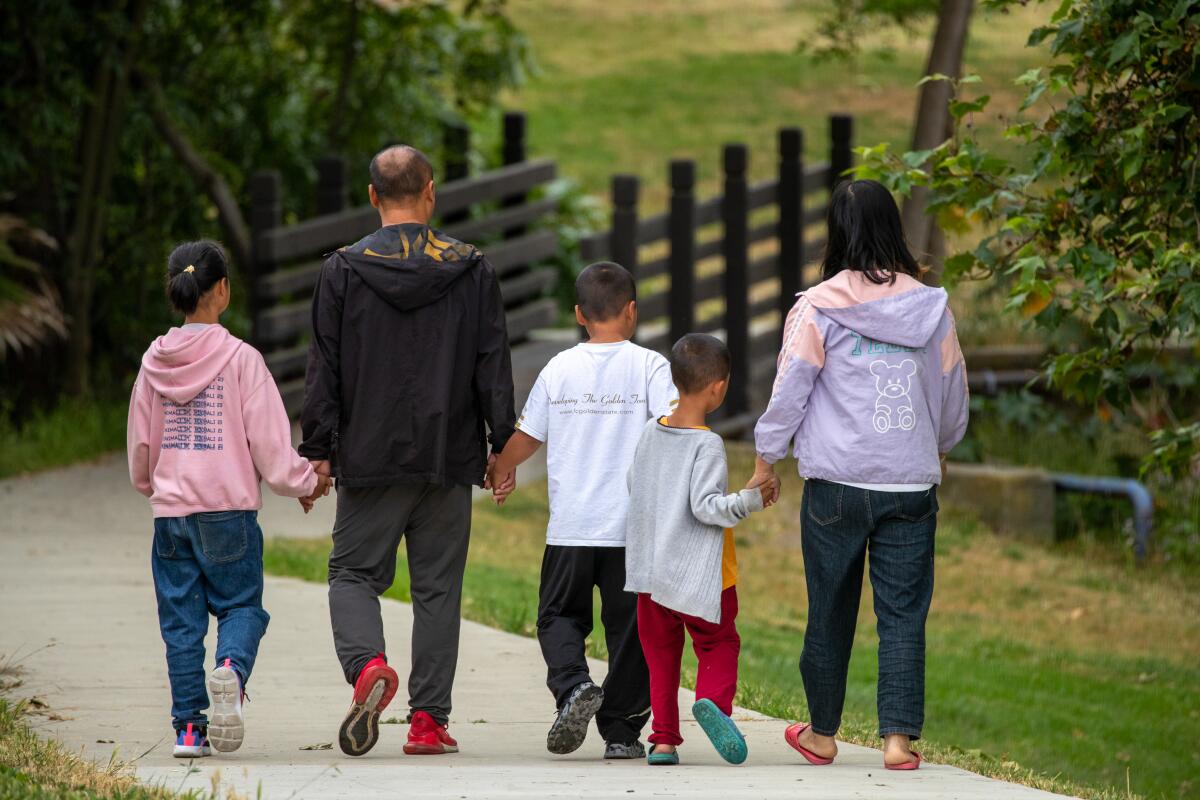
- Share via
Drawn by a message on the WeChat app, the Chinese immigrants lined up for free bags of leafy greens that volunteers handed out from a battered minivan in a Monterey Park parking lot.
Many had recently survived a novel and dangerous journey — flying from China to Ecuador, braving the treacherous rainforest of the Darien Gap on foot, then traversing Mexico by car and bus before crossing the U.S. border.
On this hot June afternoon, a woman who wore an ankle monitor so immigration authorities could track her said she had been “just getting by” running a small restaurant in Wuhan and wanted to escape the social stigma of being twice divorced.
“If your job and family situation aren’t good, there’s no future in China,” said the woman, 33, who had arrived in the L.A. area about a month earlier and would give only her English name, Sophia. “If I can get a work permit, if I can learn English, maybe I won’t feel as much under pressure.”
Monterey Park has long been a landing spot for immigrants from China with no English and a few hundred dollars in their pockets. “Family hotels” offer a cheap place to sleep, crammed in with dozens of others. Employment agencies can provide a gig at a restaurant, a warehouse or a marijuana farm — no work permit needed.
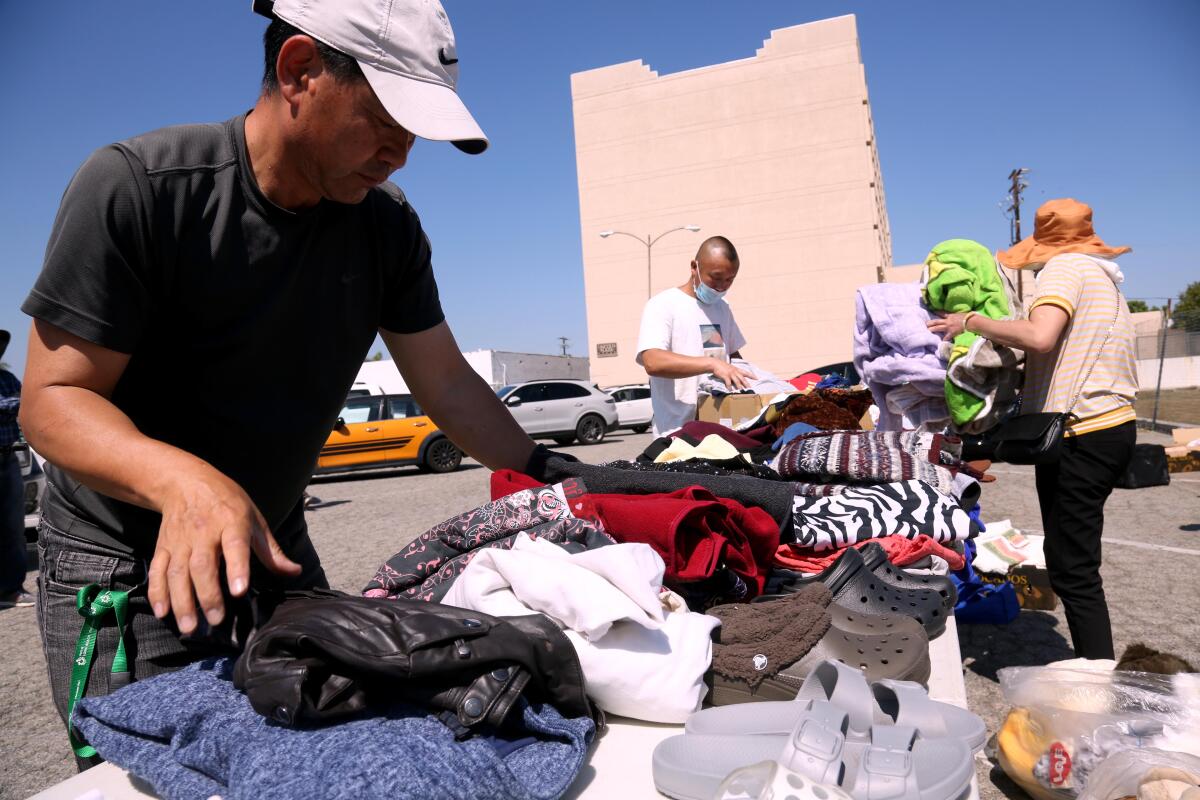
But the route that some immigrants once took — flying to the U.S. on a tourist visa and obtaining lawful status or overstaying the visa — has been largely closed off for the last few years. The recent arrivals are demonstrating new levels of desperation, willing to risk their lives, and sometimes their children’s lives, to reach American soil.
Some say they couldn’t earn enough to support their families and were traumatized by three years of pandemic lockdowns in China. Others say they are political dissidents or otherwise seeking to escape the oppression of the Communist Party.
Some plan to apply for asylum, while others have no strategy for seeking legal status. Many who spoke to The Times would not give their full names, fearing retribution against their families by the Chinese government.
The sudden influx of immigrants, which has been happening at least since December, has inspired some in the Chinese community to volunteer countless hours to help, while others grumble that the newcomers are here illegally. New phrases — “border crossers,” “walking the rainforest” — have entered the local Mandarin lexicon.
In April, U.S. immigration authorities encountered nearly 3,200 Chinese migrants at the Mexican border. Before the pandemic, in late 2019, the number was about 200 a month. The figures dropped somewhat in May and June but were still near record highs.
China’s uneven economic recovery and the difficulty of obtaining a visa are driving immigrants to brave the difficult overland journey, and pandemic travel restrictions have created pent-up demand, said Ariel Ruiz Soto, a policy analyst at the Migration Policy Institute.
“Most people believe when they come to the border, in some ways it’s easier than taking the longer, legal route,” he said.
China’s government is relaxing restrictions on night markets and street vendors to stimulate spending and create jobs, especially for young people.
In Monterey Park, many immigrants say they didn’t bother applying for a visa to fly here after hearing reports of long lines and low success rates.
In fiscal year 2019, 18% of Chinese seeking a tourist or business visa were denied. By 2021, the denial rate had skyrocketed to 79% before dipping to 30% in the fiscal year that ended in September 2022.
The Trump administration’s pandemic travel ban on non-U.S. citizens coming from China contributed to the high visa denial rate until it was rescinded in late 2021, said Jeanne Batalova, a senior policy analyst at the Migration Policy Institute.
Also, more Chinese are looking to flee the country amid worsening political persecution and a slow economy, signaling to U.S. consular officials that “people may not want to come back” and leading to more caution in issuing visas, she said.
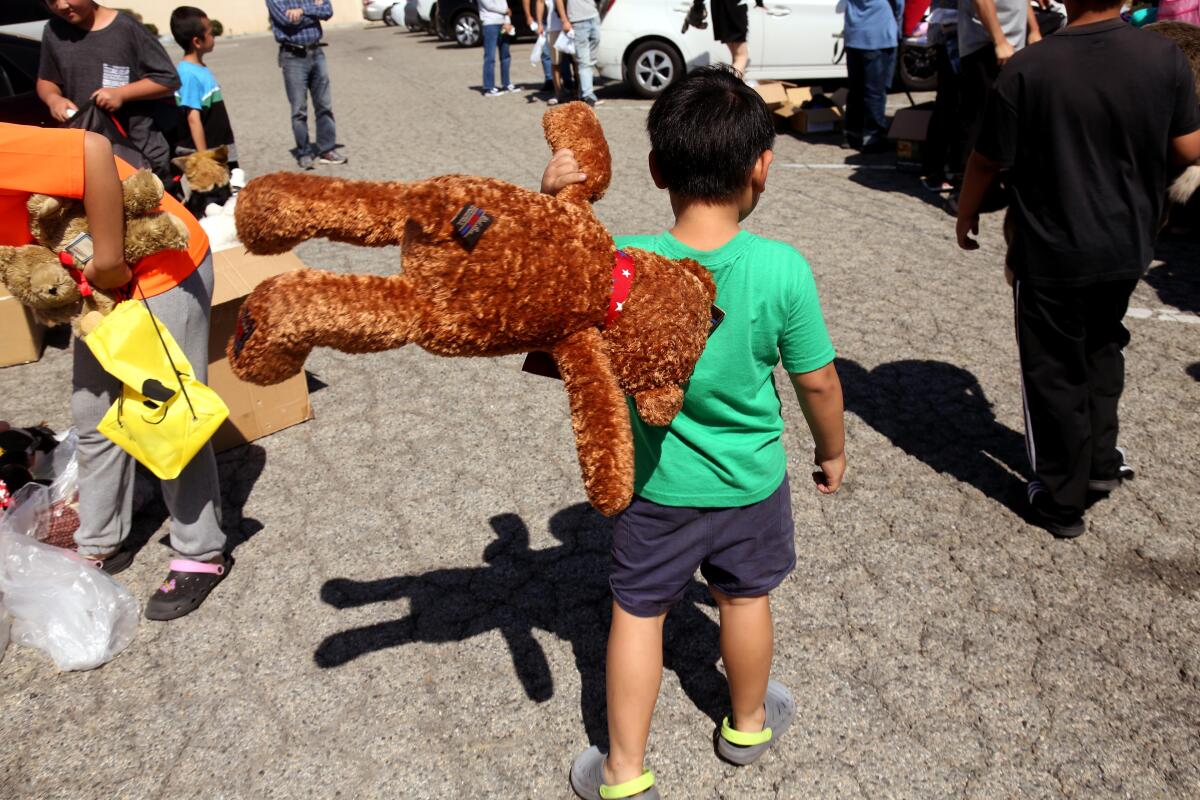
On the Chinese app Douyin, migrants post videos of themselves trudging through the rainforest. Many say they used the internet as their guide, banding together with other travelers on the route. Some had their belongings stolen or damaged while fording rivers. Some say they passed the corpses of other migrants along the way.
Chinese remain a small fraction of the total number of immigrants crossing the border. But in Monterey Park, they have changed the landscape, joining the underground labor force, enrolling their children in local schools and fueling the demand for cheap, overcrowded housing.
It is the latest iteration of a story that has unfolded for generations in Monterey Park, which has been called Little Taipei and the first suburban Chinatown, becoming the nation’s first majority Asian city in the 1980s amid a backlash from some white residents.
The Lunar New Year mass shooting in Monterey Park has residents mourning in their tight-knit suburb once dubbed the “Chinese Beverly Hills” as the population changed.
Known as “Fatty Ding” in Chinese after a now-shuttered restaurant, the shopping plaza on the northeast corner of Garfield and Garvey avenues is a common meeting spot for the new arrivals.
In January, a half-block away on Garvey, a gunman opened fire on a crowd in a ballroom dance studio. The 11 people who died were once new to the country too, with roots in Taiwan, China, Vietnam and the Philippines.
David Lu, who organized the vegetable giveaway with another volunteer, started WeChat groups in April that now count nearly 2,000 border crossers as members.
At a moving sale, Lu found a free refrigerator that he delivered to an immigrant family. For a family with four kids, he procured a sofa, tables, a TV and a DVD player. Sometimes, he pays for the items himself. He helps parents navigate school registration and found an attorney to give free immigration seminars.
When he gets a donation of food, clothes or toys, he posts a note on WeChat, and people converge on the parking lot on Garfield, across Garvey from Fatty Ding Plaza.
“We don’t have the time to wait,” Lu said. “The problem is, they can’t survive.”
Lu, 56, a Chinese immigrant who lives in Arcadia and works as an antiques appraiser, encourages new arrivals to volunteer at the giveaways so they feel useful even as they still need help themselves.
“We often have free stuff,” Lu said in Mandarin to two men who crossed the border in January, after friending them on WeChat at the vegetable giveaway. “If you need help, just say something. Let me know what you need — I can try to find it for you.”
Employment agencies become gateways to the U.S. by playing matchmaker for Chinese-run businesses and cheap labor.
A 47-year-old woman, surnamed Dai, was among the volunteers. She was living in a family hotel with her husband for $15 a night, 10 people to a room, 30 sharing a bathroom, she said.
During their three-month journey, she said, all their possessions were stolen, and they spent 20 days in immigration detention. They have an appointment with immigration authorities in September.
Since arriving in Monterey Park in February, Dai’s husband occasionally picks up landscaping jobs, and she sometimes cooks for senior citizens.
Dai said she left China because she couldn’t get much work as a cook or a nanny. During the pandemic, local officials wouldn’t let her go to her home village to see her parents, who depend on her financially, since their retirement benefits are the equivalent of about $11 a month, she said.
She hopes to someday open a restaurant serving the specialties of her native Zhejiang province, as well as northern dishes such as dumplings.
“I’m not working, so at least I can do something meaningful,” she said of volunteering. “It helps my mood. It’s better than staying home and spacing out.”
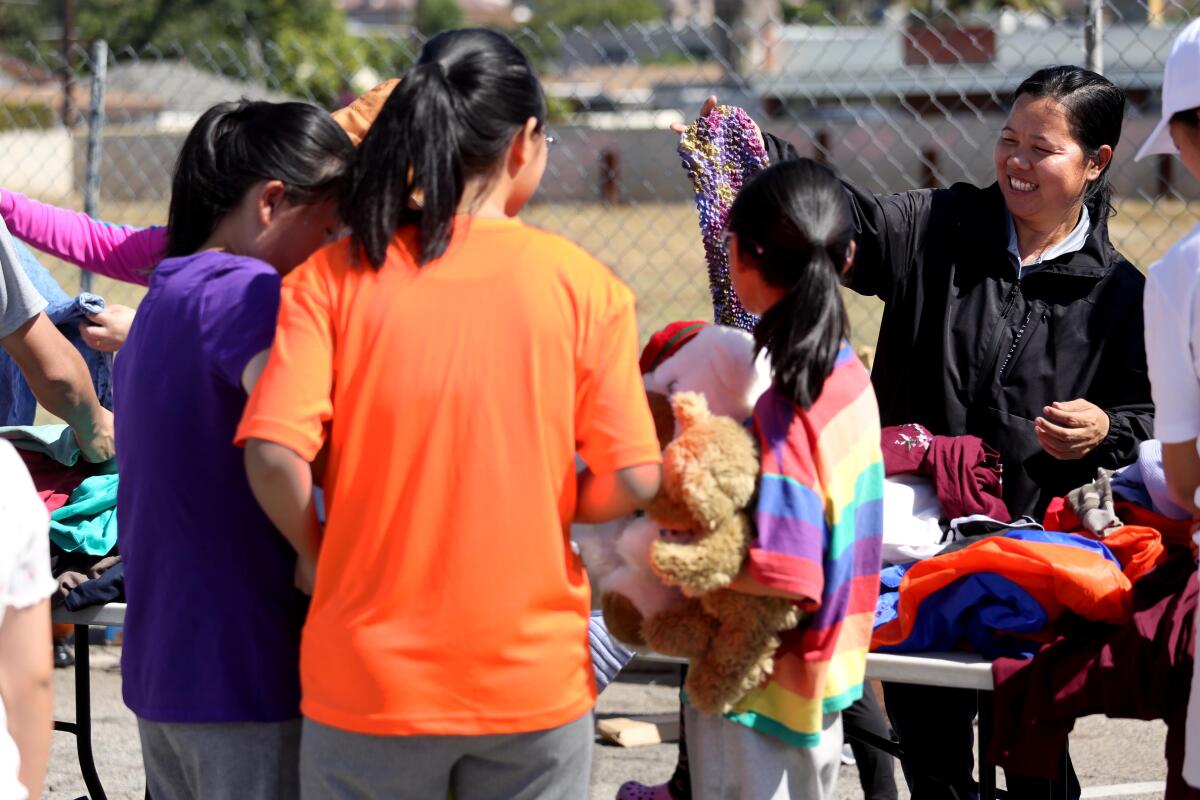
The Buddhist Tzu Chi Foundation, a Taiwanese charity with U.S. headquarters in the San Gabriel Valley, has a database of more than 1,000 recent Chinese immigrants, who are notified of food drives and other events and connected to legal and medical services, said U.S. Chief Executive Debra Boudreaux.
Boudreaux, who was born in Taiwan, said she has never seen so many Chinese immigrants arriving in such a short time. Most local food banks don’t carry Chinese rice, noodles and seasonings, so Tzu Chi tailors its giveaways to the immigrants’ tastes.
At a Tzu Chi seminar in Alhambra in June, Shidong Liang, his wife and three children ate lunch before taking home a bag of chocolate-covered Pocky sticks and other snacks appealing to Chinese palates.
The family arrived in Los Angeles on June 6 after flying to Turkey and then Ecuador — both countries that allow Chinese nationals to enter without a visa. Three Chinese they met on the road helped their 10-year-old daughter and 6- and 7-year-old sons through the rainforest, sometimes carrying the children, Liang said.
One hill was so steep that the travelers pulled themselves up by a rope.
Liang, 36, who owned a car-finishing business in Hunan province, said he didn’t want his kids to be brainwashed by the Chinese Communist Party.
He risked the perilous journey “so they can be independent. And when they grow up, to be able to have their own thoughts,” he said.
Liang said he told an immigration official he encountered at the border: “I’m finally on free soil.”
But he was uncertain whether he would apply for asylum and was not familiar with the process. He said he is not optimistic about getting a green card but hopes that he can find a good job and that his kids can attend American schools.
“I just hope they’ll establish roots here,” he said of his children.
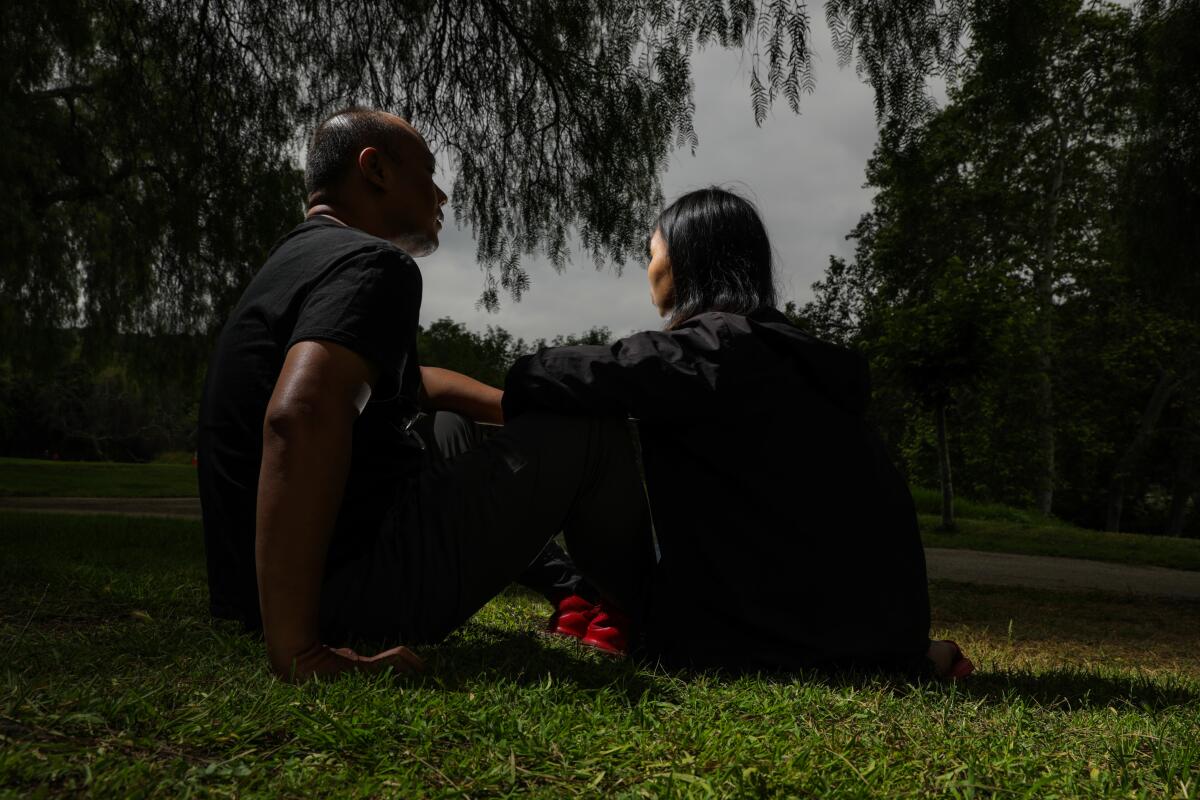
Through the app Chinese in LA, Liang found an apartment in Riverside and bought a car. A week later, the family had moved to Rowland Heights and he planned to start looking for work.
At the border, Chinese nationals were usually detained for a few days before being released into the U.S., said Xiaosheng Huang, a Diamond Bar attorney whose clients are mostly Chinese immigrants.
Since May, a federal rule has made entering the country more difficult. On Tuesday, a federal judge struck down the rule, which requires asylum seekers passing through a third country to apply for protections there, but the Biden administration immediately appealed.
China’s repression of free speech and religion gives its citizens a better chance at asylum than other nationalities, Huang said. In asylum cases adjudicated nationwide from October to April, Chinese applicants had a 57% success rate, compared with 33% for Venezuelans and 9% for Guatemalans.
Migrants who apply for asylum are typically required to appear in immigration court for a “master calendar hearing” laying out the schedule for the proceedings, which can take years to conclude, Huang said.
After 150 days, an asylum seeker can apply for a work permit.
In Alhambra at a free English class taught by missionaries from the Church of Jesus Christ of Latter-day Saints, Xuewen Wang sat at the beginners’ table, practicing words for common ailments.
“I have a runny nose,” he said. “I have a cold.”
Wang, 53, said he was a cardiologist in China. He quit practicing medicine years ago because the salary in remote Gansu province was paltry — about $700 a month, he said.
After getting divorced and going bankrupt as a small-business owner, Wang felt he had hit a wall.
In China, he said, it’s hard to move up if you don’t come from a privileged family. He decided to leave his 11-year-old son and 20-year-old daughter behind for a place where, it was said, anyone who worked hard could live a middle-class life.
From Douyin, he figured out how to fly to Turkey, then Ecuador. He joined with a band of about 60 migrants — some Chinese, some Latin American, some African, and communicating using Google Translate — to brave the rainforest and evade a series of immigration checkpoints in Mexico.
He was detained by immigration officials in Texas for two days before being released with a cellphone to track his whereabouts, he said. He flew from Houston to L.A., arriving on March 24.
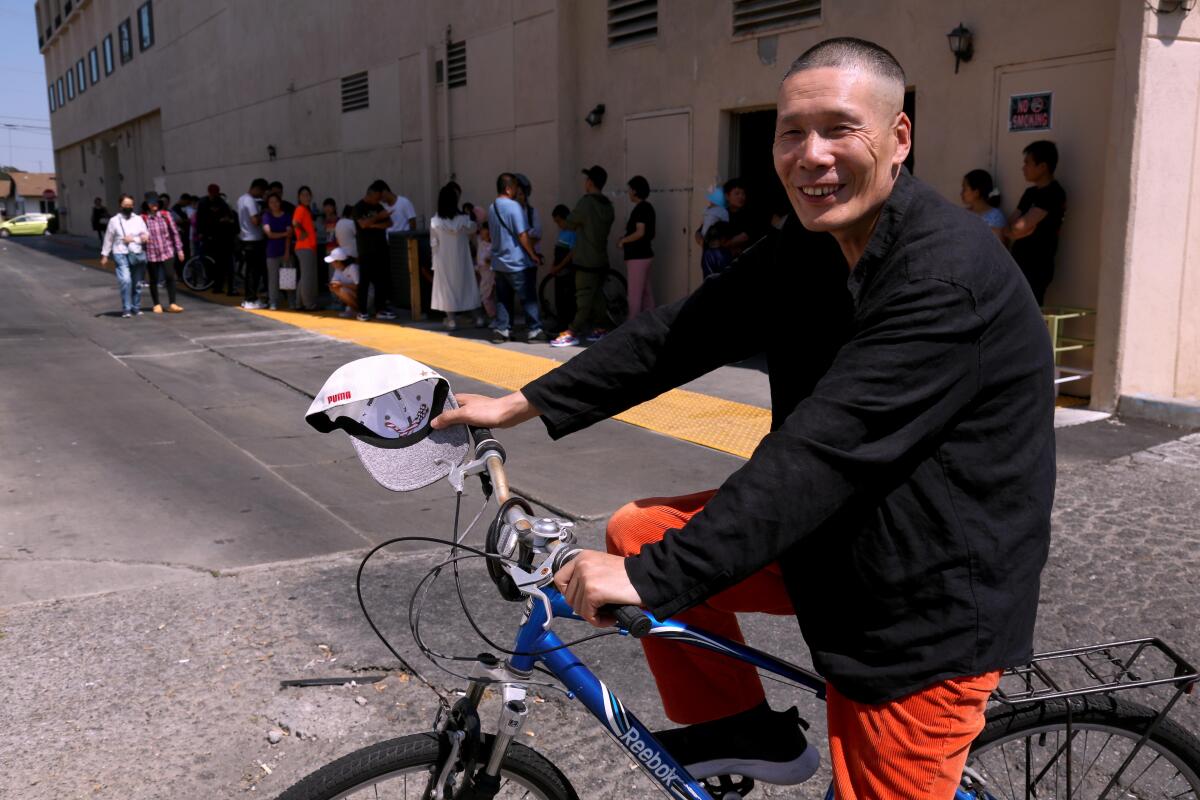
With his limited English, Wang doesn’t expect to practice medicine again. After he gets his work permit, he hopes to become an Uber driver and then a long-haul truck driver.
“I knew the U.S. would be this type of environment. Mutual respect. Even if you’re not upper class, you can still make money,” he said in Mandarin tinged with the brogue of his native Shandong province. “You can work any kind of job for an hour and make enough to eat for a week.”
Through friends, he found an under-the-table job at a warehouse. But the work was too draining, he said.
Next, he went to a marijuana farm in Adelanto, which paid $3,500 a month. He ended up quitting that too, then signing up for another warehouse job at $15.50 an hour, then another marijuana farm, then a garment factory in Palm Springs.
Wang has hired a lawyer to help with his asylum case. Since he has been attending church here, he will claim that he could not practice his faith in China. He was involved in the 1989 democracy movement as a student, which put a permanent target on his back, he said.
A friend in New York has urged him to join her and train as a massage therapist.
If he can nail that down, he said, he will probably try his luck there.
Times staff writer Stephanie Yang and special correspondent David Shen in Taipei contributed to this report.
More to Read
Sign up for Essential California
The most important California stories and recommendations in your inbox every morning.
You may occasionally receive promotional content from the Los Angeles Times.
